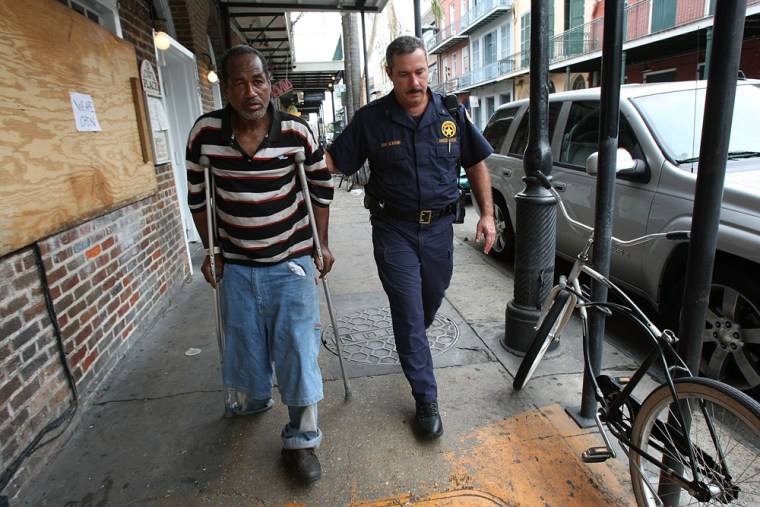More than a week ago, at the first hint Gustav could be a threat to New Orleans, police Superintendent Warren Riley issued an unusual order — he gave all the city's 1,485 officers paid time off to get their families to safety.
It was a lesson learned from the bitter experience of Hurricane Katrina, when dozens of officers were roundly criticized for abandoning their posts as their colleagues and the citizens they were sworn to protect were left swamped, scared and at the mercy of lawlessness. Some were called cowards. Several dozen ended up being fired.
Many of the officers who left said the storm forced them to make an agonizing choice: Take care of strangers or take care of your family.
This time around, the department was doing all it could to make sure that officers had enough of a chance to do both, well ahead of Gustav's landfall.
"It's a double-edged sword, and it's either your co-workers or your family," said Officer Carolyn Dalton. "And I will choose my family every time."
Dalton, who stood by her post during Katrina, took her two sons to her mother's house in the days leading up to that storm. This past weekend, she made the journey again, leaving 15-year-old son Lace with a hug and some money, then returning to New Orleans for her 7 a.m. shift.
Dalton, an 11-year veteran of the force, said she is simply doing what she has to do as a police officer. But she won't fault the choice that others made three years ago.
"It's only so much a human being can take," she said while managing an evacuation checkpoint. "Some of us are much stronger than others. ... I know several officers who were fired. They were damned good officers."
97 percent turnout promised
Riley said 97 percent of the city's officers were staying but officials would try to be flexible with those would couldn't cope and asked to leave. In the meantime, some 1,500 National Guardsmen were on hand to help out.
While hundreds of officers were initially believed to have abandoned their posts after Katrina, the numbers turned out to be much lower. Most were simply stranded, unable to report for duty.
A disjointed and antiquated communications system — coupled with crippled cell phone service — prevented various police departments and emergency rescue agencies from talking with one another. Some police districts were without boats to get around in the flood waters. More than 300 police vehicles were destroyed in flood waters.
In the weeks and months afterward, the force took other blows — retirements and suicides — that reduced the police force by nearly a third.
In the years since Katrina, a communications system was set up that allows all the various police departments and emergency agencies to talk with one another. All police districts now have boats. And police cruisers are being put out of harm's way, parked in high-rise garages.
Asked if the measures will work, police spokesman Bob Young said: "The superintendent has done everything possible to ensure the officers will stay in, and he's confident none of them will leave."
While stories of police heroism emerged from Katrina and the post abandonments were fewer than believed, there were also ugly images involving officers. A handful of appeared to go rogue, participating in beatings and shootings. The city was out of control, and police, in some cases, appeared complicit.
A former police superintendent aggravated the perception problems by seemingly confirming bogus rumors that armed gangs had seized control of the convention center, and were raping and killing at will.
Wounds remain from bridge killings
Then police shot and killed two men trying to cross the Danziger Bridge in search of food. The wounds from that incident remain open: Just weeks ago, a judge threw out murder and attempted murder charges against those involved.
Danatus King, president of the NAACP's New Orleans chapter, said some "bad elements" still must be removed from the force. However, "short of another Katrina, our community is confident the force will take care of our needs."
The failure of the levees was a catastrophic event the city could not have prepared for, King said, and is "a really bad gauge" for judging the overall performance of the police.
"Those problems are not indicative or reflective of the force as a whole," King said. "The force as a whole is doing a good job."
The real-life drama in the NOPD even spawned a fictional counterpart, the Fox TV police drama "K-Ville." One recurring character had deserted his partner during Katrina, then tried desperately to return to the force.
"I have a lot of admiration for the police that stayed," Officer John Blatcher, a 16-year veteran, said as he kept order in the Upper Ninth Ward, where poor and disabled residents boarded buses to safety.
"I couldn't tell you what I would do in that scenario, not knowing where my family is," he said. "You can't perform your job if you're worried about where your family is, regardless of your occupation."
Blatcher's wife and children left for Atlanta on Saturday, figuring hotel rooms would be plentiful, so he won't have to choose, either.
"We try to learn the lessons of the past," he said. "I think the city of New Orleans has learned the lessons of Katrina."
